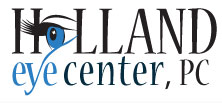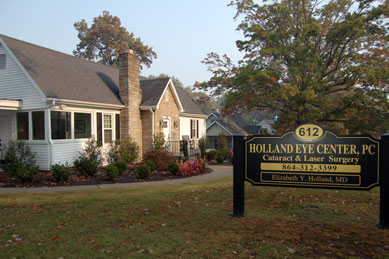Comprehensive Eye Care
Related Links
Dr. Elizabeth Holland offers a full range of eye care services, including the diagnosis and treatment of diseases of the eye, utilizing the latest state of the art equipment. These services include routine annual eye exams, diabetic, glaucoma, macular degeneration and cataract evaluation and treatment, contact lens fittings and follow up, and the treatment of dry eyes and blepharitis.
Dr. Holland recommends that all patients over the age of 50 should have routine annual eye exams to diagnose diseases of the eye, as usually during this time glaucoma, cataracts, and increasing dependence on glasses can be developing. Diagnosing and treating eye diseases early can prevent vision loss. Under the age of 50, eye exams should be performed every two to three years. If you wear glasses or contact lenses or have a family history of eye disease, you should be seen annually.
Cataracts
The vision changes from cataracts can be so gradual that the patient does not even realize they are losing vision. The first symptoms of cataract might be glare at night or blurry vision. If you have already been diagnosed with cataracts, yearly exams are recommended to document changes in your vision and to ensure that the cataracts are not progressing or causing problems. If the cataracts are progressing and affecting your vision, Dr. Holland is an accomplished cataract surgeon and can discuss your surgical options. The most advanced implant technology can be used to replace the cataract at the time of cataract surgery. Premium implant technology has advancing significantly in the last few years. Many implant choices exist, including monofocal (distance) lenses, trifocal, multifocal, extended depth of focus and accommodating intraocular lenses.
Diabetes
If you have diabetes, you should have your eyes examined every year to detect early changes of diabetic retinopathy. Since it is often not known how long someone has been a diabetic prior to be diagnoses with diabetes, a dilated exam is needed to make sure there are no signs of diabetic retinopathy. Patients with diabetic retinopathy are commonly seen yearly and sometimes more frequently to carefully document changes in the retinopathy to avoid vision loss. Dr. Holland has the latest in digital retinal photography and macular optical tomography that can be utilized to document any changes of retinopathy between examinations.
Glaucoma
Glaucoma is a potentially sight threatening disease, where high or normal pressure in the eyes can cause damage to the optic nerve affecting the peripheral vision. Most people do not even realize that they have glaucoma as the changes occur gradually in the periphery. By the time the patient can see the visual changes from the glaucoma, the disease is usually advanced. With early detection, glaucoma can be treated to prevent vision loss. Routine screening is recommended to check the pressure and examine the optic nerve for disease. If any abnormality is diagnosed, Dr. Holland may recommend additional testing to check for glaucoma. Dr. Holland has the latest in visual field technology, digital photography, and optic nerve visualization to diagnose, document progression of the disease and recommend treatment modification as necessary.
Macular Degeneration
Macular degeneration is a progressive aging change in the central seeing part of the eye, the macula. Drusen and pigmentary changes develop in the retina, which affect the central vision. New blood vessels can develop in the diseased retina which can cause a rapid decrease in vision. Dr. Holland has the latest in digital retinal photography and optical macular tomography to detect these changes early to prevent vision loss. At home monitoring with an Amsler grid and vitamin supplements may help to reduce the progression of the retinopathy. If the macular degeneration progresses to the "wet form", referral to a retinal specialist may be required.
Dry Eyes and Blepharitis
Dry eyes and blepharitis affect a large percentage of the population. Especially with the increase in computer usage, dry eyes can be very bothersome. Dr. Holland has a special interest in the treatment of blepharitis, an inflammation of the lids of the eyes and dry eyes. She may recommend lid hygiene, drops, and vitamin supplementation for treatment of the dry eyes and blepharitis. She also can perform BlephEx, a treatment which deep cleans the lashes and lid margin, to improve advanced blepharitis.
Contact Lenses
If you are currently a contact lens wearer, your eyes should be examined yearly to ensure that the contact lenses are fitting well and providing the best vision. Make sure that you wear your contacts as instructed and cleaning them regularly. Alternately laser vision correction might be an option for you, and you may discuss this with Dr. Holland during your exam.
Come in today for your eye exam.




